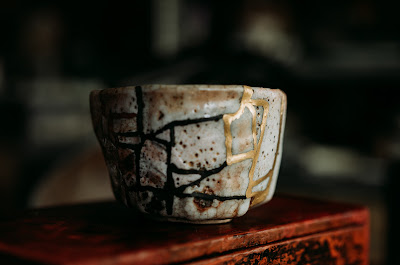Writing is an act of repair
 |
| Photo by Motoki Tonn on Unsplash |
Today marks one year since my first book, Amen? Questions for a God I Hope Exists, debuted. When I first started thinking about this milestone entry, I was envisioning cheery photos and balloon emojis and earnest takeaways about my publishing career thus far. But then the world caught fire (again), and I feel compelled to say something else instead.
When terrorism erupts, when war ignites, when children die, I find myself paralyzed. It is all so violent and fraught and devastating and deplorably commonplace at the same time. What the hell are we on Earth about? Hell itself? In what way does this bloodshed build the kingdom of God? Instead we have another slaughter of the innocents, a tragically daily occurrence around the world because we humans cannot get our sh*t together.
In response to the recent atrocities in Gaza, author, writer, and minister Danté Stewart wrote on X (Twitter), "We, the people of the Earth, need a National Day of Mourning. The collective tragedies and traumas we have to hold at once is unprecedented. We are exhausted and have depleted our spiritual resources for justice. We are afraid. What is happening is unfair. We need to grieve."
His idea struck a deep, hurting chord in my chest, because it manages to feel healing, revolutionary, and impossible all at once. Stewart is absolutely right; we do not pause long enough as individuals or as a society to absorb the scale and scope of our losses. And I suspect we do not because we know on an instinctual level of self-preservation that doing so will shatter us, and we are petrified we will not be able to put ourselves back together again.
Our innate wiring to survive, our will to live first and thrive later, is outweighing and overriding a more imaginative call to let some broken pieces stay lost, to leave some edges askew, to create beauty and meaning with new, unexpected arrangements. How otherwise could we have arrived at this point where we seem to have lost our hope? How otherwise can I hear so many people cry out for love, peace, and empathy, yet not see individual compassion morph into global action? Where is the groundswell, and how can I best add to it?
One of the things I have always loved about the cover of Amen? are the gold threads running through it, delicate but vivid. When the book came out, a friend remarked it looked like Kintsugi, the Japanese art of repairing broken pottery with gold, transforming flaws into a lovely, strong, and indispensable part of the object's evolution. I thrilled to the comparison, of course, given the book's themes of doubt, exploration, and spiritual growth, but I see now how the observation extends beyond the cover to creativity itself.
Strong writing—work created with the skill and empathy to articulate what people often feel only on a wordless level—is Kintsugi. Strong writing says to hearts that yearn to shatter, "Go ahead. Break apart. You are free and safe to do it, because I stand ready to collect the pieces you were courageous enough to release, and I will reassemble them in such a way that you will see your broken heart anew."
I am not claiming writing saves the world. Rather, I'm saying that writing—all art, really—helps make meaning, which guards our souls against hopelessness, and when we can keep a sprig of hope alive even amid the deadliest, darkest turmoil, we are much better equipped to then consider how we can contribute to saving the world.
On this, the first anniversary of my first book, I am putting aside sales numbers and marketing tactics, social graphics and platform stats, and I instead recommit to being glue: a sticky, tenacious bond for mind and soul, a gold-lined reminder of our shared human condition.
Prayer #393: Shard
My jagged edges
lean into the bonding gold;
at rest, my hope thrums.
Amen.